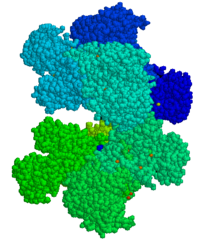
Photo from wikipedia
BACKGROUND Glucose-6-phosphate dehydrogenase (G6PD) deficiency affects 6.0% of the global population. G6PD deficiency has been associated with lower risk of cardiovascular disease and higher risk of diabetes, which could be… Click to show full abstract
BACKGROUND Glucose-6-phosphate dehydrogenase (G6PD) deficiency affects 6.0% of the global population. G6PD deficiency has been associated with lower risk of cardiovascular disease and higher risk of diabetes, which could be etiologically informative, but these relations are uncertain. To clarify, we assessed the associations of G6PD deficiency with serum metabolite profiles in late adolescence. METHODS In a nested case-control study of 50 G6PD-deficient late adolescents (~17.5 years) and 150 sex-matched non-G6PD-deficient controls from a Chinese birth cohort: "Children of 1997", we compared 80 serum metabolites analyzed by nuclear magnetic resonance spectrometry using adjusted linear regression with Bonferroni correction for testing 12 traits (p < 0.0042). RESULTS G6PD-deficiency was inversely associated with serum levels of total cholesterol (-0.27 mmol, 95% confidence interval (CI) -0.46, -0.09, p = 0.004), free cholesterol (-0.08 mmol, 95% CI -0.13, -0.03, p = 0.003) and creatinine (-0.004 mmol, 95% CI -0.007, -0.001, p = 0.003), adjusted for sex and parental education. G6PD deficiency was not associated with fatty acids, amino acids, glucose or related metabolites, ketone bodies or glycoprotein. CONCLUSIONS G6PD deficiency is associated with lower serum levels of cholesterol and creatinine, but not other serum metabolites. Whether such differences are transient or become more evident in adulthood warrant further investigations.
Journal Title: International journal of cardiology
Year Published: 2019
Link to full text (if available)
Share on Social Media: Sign Up to like & get
recommendations!